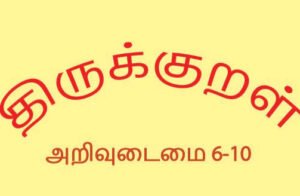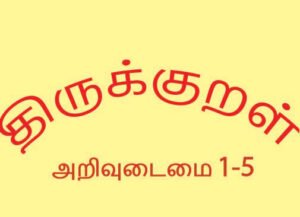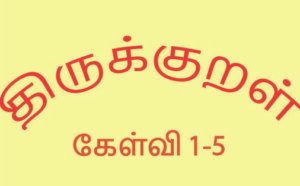The Jackal Dhamanaka wanted to help the lion king but his brother, Karataka thought it was none of their business. When Dhamanaka disagreed, Karataka cautioned him that butting into other people’s business may create more problems for them. He began to narrate the story of the monkey and the wedge to warn his brother.
The Monkey and the Wedge
Karataka began the story of the monkey and the wedge.
“In the kingdom of Magadha lived a man named Subhadanta who wanted to build a monastery. So he bought some land and hired workers to make one to his liking. Constructing a building takes time, and labourers have to take a break, too, don’t they? A carpenter at the building site sawed one end of a wooden beam and tucked a wedge in the middle to keep the two ends separate. Then the man left to run some other errands.
A passing troop of apes saw the empty construction site. Now, they were curious. And what do you do when you are curious? You go exploring, right? One ape was drawn to the split timber as if he was fated to do so. He sat on one half of the divided log without any care and pulled at the wedge. And yes, it took some effort to pull it out, but he had no time to rejoice. Because, in the blink of an eye, the two ends of the beam snapped shut. The bottom half of the ape’s body was crushed, killing him instantly.”
Karatka narrowed his eyes and looked up at Dhamanaka. “And, THAT is why I say all this is none of our business. The lion eats, doesn’t eat, or the lion mopes, doesn’t mope—it has nothing to do with us.”
“But…but…it is the servants’ responsibility to take care of their master‘s well-being,” protested Dhamanaka.
“Well, others can take care of this, like the prime minister. He is the one who supervises everything that happens in the kingdom, right? All this ‘Taking care of the king’ stuff is his job. Let him do it. If unimportant people like us butt in and do his work, we’ll end up being sorry. Don’t you know what happened to the ass who brayed to help his master?”
“No, I don’t! What happened to the ass?”
“Duh! He was beaten! That’s what!”
“Why was he beaten? What did he do? Who beat him?” spluttered Dhamanaka.
Karataka glared at him. Then he rolled his eyes, took a deep breath, and narrated the story.
The Story of the Washerman’s Jackass
A washerman named Karpura Pataka lived in the city of Varanasi. One night, a robber broke into his house. The washerman was in a deep sleep and didn’t hear the robber moving around. Earlier in the day, the man had tied his jackass to a post in the courtyard. His dog lay there beside the ass, lounging lazily. The ass was alarmed.
“Hey! Aren’t you supposed to bark and wake the master? Why are you so quiet?”
The dog looked down his snout at the ass. “Great! So you want to tell me how to do my job, is it? Ha? Haven’t I been guarding this house all these days without your help?” he sneered.
Then shaking himself smartly, the dog continued. “I’ve noticed for some time now that the master ignores me. He’s too busy even to put my food out regularly. People like him don’t care for their workers unless they need something from us. He must be reminded that taking care of me is important! And this is MY opportunity!” He nodded to himself.
The ass couldn’t believe his ears! “You rotten scoundrel!” he blasted the dog. “Don’t you know it is wrong to bargain for things when someone needs your help? What kind of a friend or servant are you?”
The dog replied coolly, “And what kind of a master is he who cares for his servants only when he wants something from them?”
The ass was indignant. “You fooled everyone into thinking you are man’s best friend. But you are the best friend who is too selfish to warn his master! Nice! You know what, though? I’m here, and I am not like you! I will wake him up because I know I must serve my master wholeheartedly and do my duty at the right time. Guess I’ll have no regrets about ignoring my responsibilities when I die. So there!”
And with that, the jackass drew a long breath in and brayed loud and hard. The noise rang loud in the quiet of the night. The washerman’s eyelids ripped open in shock. “Wha? Wha? What?” he sat up. Then he stumbled out of bed and into the courtyard. There was no one around! He didn’t know that the thief dropped everything and fled. The washerman’s mind clleared! ‘The ass!” he thought as his eyes searched the courtyard for the animal. He marched to the ass, grabbing a stick from the ground. The dog watched again in silence as the master thrashed the other animal.”
“And that,” said Karataka, “is why we must not poke our nose in other people’s business. Our job is to find prey. Let us do that and be happy with our life. Oh, by the way, we do not need to do even that today. Because there’s plenty of food leftover from the earlier hunt.” Then he stretched his legs and lay down on the forest floor.
Dhamanaka felt red hot. “Are you telling me that you only serve our king to fill your stomach after he hunts his prey? Don’t you feel ashamed to say such a thing? Everybody has to eat, what’s the big deal in that? It is more important to live with honour!
It is easy to get some people to work for you. They’ll do it if you give them a little bit of money. Others may demand more money, but you can get even these people to do your work. But a few people can’t be bought! That’s because they have honour and integrity. Don’t you think we should be like that? Look at the dog and the lion. If you throw a dog a bone with a little bit of flesh on it, the animal will chew on every little bit of it. But take the lion. He will let a small animal, like a jackal, escape because he wants to attack the mighty elephant.
My dear brother! We must want to achieve something great and purposeful in our lives—something more than eating! Otherwise, we lead a meaningless existence!”
Karataka raised his eyebrows at his brother. “Dhamanaka, have you forgotten that we are ordinary workers who must do as we are told and no more? We have no power! So all this stuff about leading a meaningful life sounds very noble, but it is not for us.”
“I disagree! Someone who has no power today may be at the top tomorrow. Our positions can change anytime. That is if we work for things to change, not by sitting on our butt. Dragging a rock up a hill can be very difficult, but we can roll it down the hill in the blink of an eye. It is in our hands whether we want to dig ourselves into a deep hole or if we want to rise to the sky. What we become tomorrow depends on our actions today.”
“So, what are you saying, Dhamanaka?” the other jackal asked him.
“Something happened when the king went for a drink; something serious enough to frighten him into hiding here!” Dhamanaka answered.
To be continued…
Watch a variation of this story here:
Click here to listen to the previous episode:
Episode 8: The Lion, the Jackals and the Bull





